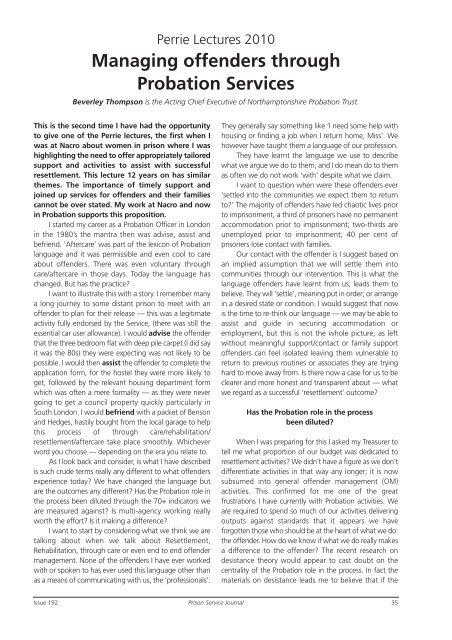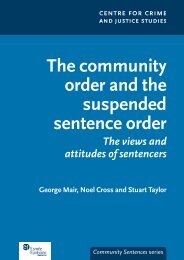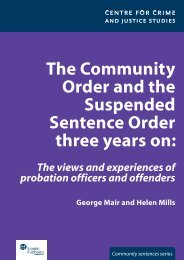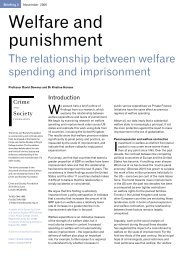PRISON SERVICE
PRISON SERVICE
PRISON SERVICE
- No tags were found...
You also want an ePaper? Increase the reach of your titles
YUMPU automatically turns print PDFs into web optimized ePapers that Google loves.
Perrie Lectures 2010Managing offenders throughProbation ServicesBeverley Thompson is the Acting Chief Executive of Northamptonshire Probation Trust.This is the second time I have had the opportunityto give one of the Perrie lectures, the first when Iwas at Nacro about women in prison where I washighlighting the need to offer appropriately tailoredsupport and activities to assist with successfulresettlement. This lecture 12 years on has similarthemes. The importance of timely support andjoined up services for offenders and their familiescannot be over stated. My work at Nacro and nowin Probation supports this proposition.I started my career as a Probation Officer in Londonin the 1980’s the mantra then was advise, assist andbefriend. ‘Aftercare’ was part of the lexicon of Probationlanguage and it was permissible and even cool to careabout offenders. There was even voluntary throughcare/aftercare in those days. Today the language haschanged. But has the practice?I want to illustrate this with a story. I remember manya long journey to some distant prison to meet with anoffender to plan for their release — this was a legitimateactivity fully endorsed by the Service, (there was still theessential car user allowance). I would advise the offenderthat the three bedroom flat with deep pile carpet (I did sayit was the 80s) they were expecting was not likely to bepossible. I would then assist the offender to complete theapplication form, for the hostel they were more likely toget, followed by the relevant housing department formwhich was often a mere formality — as they were nevergoing to get a council property quickly particularly inSouth London. I would befriend with a packet of Bensonand Hedges, hastily bought from the local garage to helpthis process of through care/rehabilitation/resettlement/aftercare take place smoothly. Whicheverword you choose — depending on the era you relate to.As I look back and consider, is what I have describedis such crude terms really any different to what offendersexperience today? We have changed the language butare the outcomes any different? Has the Probation role inthe process been diluted through the 70+ indicators weare measured against? Is multi-agency working reallyworth the effort? Is it making a difference?I want to start by considering what we think we aretalking about when we talk about Resettlement,Rehabilitation, through care or even end to end offendermanagement. None of the offenders I have ever workedwith or spoken to has ever used this language other thanas a means of communicating with us, the ‘professionals’.They generally say something like ‘I need some help withhousing or finding a job when I return home, Miss’. Wehowever have taught them a language of our profession.They have learnt the language we use to describewhat we argue we do to them, and I do mean do to themas often we do not work ‘with’ despite what we claim.I want to question when were these offenders ever‘settled into the communities we expect them to returnto?’ The majority of offenders have led chaotic lives priorto imprisonment, a third of prisoners have no permanentaccommodation prior to imprisonment; two-thirds areunemployed prior to imprisonment; 40 per cent ofprisoners lose contact with families.Our contact with the offender is I suggest based onan implied assumption that we will settle them intocommunities through our intervention. This is what thelanguage offenders have learnt from us; leads them tobelieve. They will ‘settle’, meaning put in order; or arrangein a desired state or condition. I would suggest that nowis the time to re-think our language — we may be able toassist and guide in securing accommodation oremployment, but this is not the whole picture, as leftwithout meaningful support/contact or family supportoffenders can feel isolated leaving them vulnerable toreturn to previous routines or associates they are tryinghard to move away from. Is there now a case for us to beclearer and more honest and transparent about — whatwe regard as a successful ‘resettlement’ outcome?Has the Probation role in the processbeen diluted?When I was preparing for this I asked my Treasurer totell me what proportion of our budget was dedicated toresettlement activities? We didn’t have a figure as we don’tdifferentiate activities in that way any longer; it is nowsubsumed into general offender management (OM)activities. This confirmed for me one of the greatfrustrations I have currently with Probation activities. Weare required to spend so much of our activities deliveringoutputs against standards that it appears we haveforgotten those who should be at the heart of what we do:the offender. How do we know if what we do really makesa difference to the offender? The recent research ondesistance theory would appear to cast doubt on thecentrality of the Probation role in the process. In fact thematerials on desistance leads me to believe that if theIssue 192Prison Service Journal35











